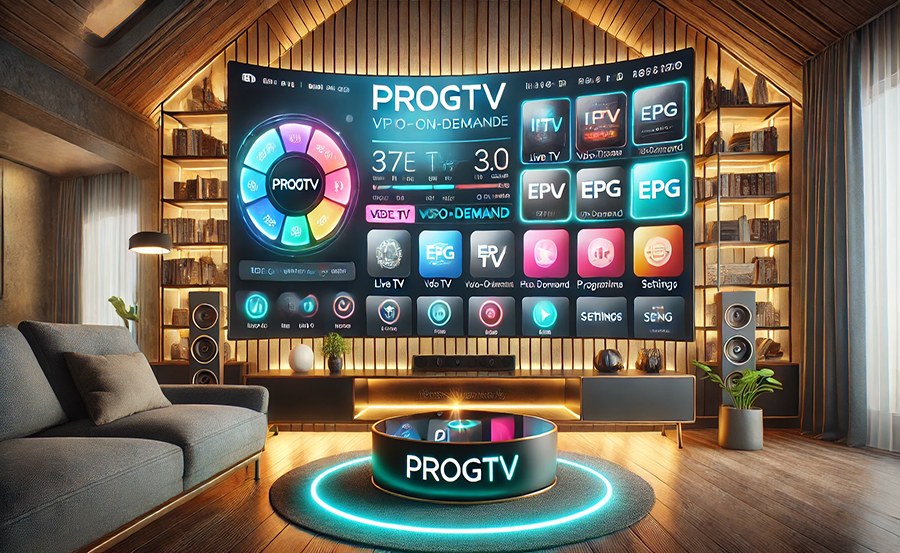In today’s fast-paced digital world, IPTV (Internet Protocol Television) has emerged as a revolutionary way to consume content, shifting the paradigm from traditional broadcasting models. The demand for IPTV services has surged, catalyzing an array of business models that promise innovative revenue streams. But what really drives the money machine in this industry? This article aims to unravel the business dynamics of IPTV and spotlight why Rapid IPTV holds the crown as the best IPTV subscription globally. So, sit back and explore the fascinating realm of IPTV business models.
Buy 1 Year IPTV Subscription and Enjoy Unlimited Content
Understanding the Basics of IPTV
Let’s face it: the way we consume media has changed dramatically over the years. IPTV has become a pivotal player in this transformation. At its core, IPTV delivers television content using internet protocols, as opposed to traditional satellite and cable methods. This means users can access their favorite shows, movies, and more, at their convenience, without the limitations of timing.
What is IPTV?
IPTV, or Internet Protocol Television, involves streaming media content that is delivered via the internet rather than through traditional terrestrial, satellite, or cable formats. Unlike other media services, IPTV provides the capacity to stream content in a continuous and smooth manner.
The beauty of IPTV lies in its flexibility. Users aren’t bound by rigid schedules and can watch their preferred content whenever they choose. With advancements in technology, HD IPTV subscriptions like Rapid IPTV ensure high-quality viewing experiences, making time-lag and buffering frustrations a thing of the past.
How Does IPTV Work?
At its simplest, IPTV streams content to end-users through a set-top box (STB) connected to the internet. This device decodes the signals, rendering them viewable on a television screen. Users can also access IPTV on various devices such as smartphones, tablets, and computers, making it a versatile option for modern viewers.
Infrastructure plays a crucial role in the delivery of IPTV services. Stable, high-speed internet connections are essential to ensure uninterrupted streaming, which is why partnerships with ISPs (Internet Service Providers) can be a significant component of any successful IPTV business model.
- The choice of content delivery network (CDN) is vital for service reliability.
- Using efficient compression technology reduces bandwidth usage.
Key IPTV Business Models
The evolution of IPTV has spawned various business models, each with its unique approach to generating revenue. Understanding these models is essential for companies aiming to make a mark in this competitive landscape.
Subscription-Based Model
The most prevalent business model in the IPTV space is the subscription-based one. This model involves users paying a recurring fee to access content. Companies like Rapid IPTV offer a range of subscription plans, tailored to meet diverse viewing needs and budgets. The subscription model guarantees a steady revenue stream, which is particularly appealing in the IPTV industry.
With Rapid IPTV, users enjoy a premium service with access to an extensive library of content that’s continually updated. Such offerings provide immense value, drawing more subscribers and sustaining business growth.
Advertising-Funded Model
Another common IPTV business model is advertising-funded. Here, revenue is generated through advertisements presented during the content viewing experience. This model allows IPTV services to offer free or lower-cost access to users, offsetting costs with the generated ad revenue.
This model requires a delicate balance, ensuring that ad quantity and placement do not hamper viewer experience. Moreover, partnerships with advertisers and brands are critical to maximizing the potential revenues in this model.
- Strategic placement of ads is crucial for maintaining viewer engagement.
- Utilizing user data can help target advertisements more effectively.
Innovative Revenue Streams in IPTV
IPTV has paved the way for innovative revenue streams that add layers of diversity to traditional business models. Let’s explore some approaches companies are adopting to enhance profitability.
Pay-Per-View (PPV) Model
Pay-Per-View is a novel approach allowing users to purchase content on a singular basis, typically for special events or premieres. Though not as consistent as subscription revenue, PPV offers a lucrative opportunity, especially during premier sports events or live concerts.
For companies like Rapid IPTV, PPV can be a compelling add-on feature, providing users the option to enhance their viewing experience with exclusive events.
Content Syndication and Licensing
Another stream involves syndicating or licensing content to other IPTV providers. This allows for cross-platform visibility and generates additional income. Content producers earn through licensing fees, while consuming platforms enjoy varied content selections, enhancing user satisfaction.
These partnerships often lead to multi-channel expansion, paving the way for IPTV providers to collaborate and strengthen their ecosystem.
The Role of Technology in IPTV Development
Technology is the backbone of IPTV, significantly influencing how services are delivered and consumed. Thus, staying at the forefront of technological advancements is paramount.
Impact of 5G on IPTV
The advent of 5G technology has had profound impacts on IPTV, promising higher speeds and reduced latency, which are critical for seamless streaming experiences. Rapid IPTV has capitalized on this, optimizing its services to leverage 5G’s capabilities for unparalleled quality.
As 5G becomes widely available, IPTV providers that adapt quickly are likely to maintain a competitive edge, attracting tech-savvy consumers who demand speed and reliability.
Artificial Intelligence and Personalization
AI has introduced personalization into the IPTV landscape. Through advanced algorithms, IPTV providers can analyze user behavior, tailoring content recommendations, and improving user engagement. This personalized experience enhances satisfaction and retains subscribers.
Companies like Rapid IPTV implement AI-driven analytics to refine service offerings continuously, ensuring they meet the evolving needs of their customers.
Spotlight on Rapid IPTV: The Best IPTV Subscription
Amongst a sea of competitors, Rapid IPTV shines as a leading service provider, thanks to its commitment to quality and customer satisfaction. But what sets it apart?
Unmatched Content Library
Rapid IPTV boasts an extensive content library spanning multiple genres and regions. Whether it’s the latest blockbuster movie or live sports, Rapid IPTV offers a variety that ensures subscribers never run out of options.
Unlike some services that tend to flood platforms with repetitive content, Rapid IPTV continually updates its library, reflecting current trends and consumer interests.
Exceptional Customer Service
The dedication to quality doesn’t stop at content; Rapid IPTV is committed to providing exceptional customer service. With a professional support team at the ready, users receive timely assistance for any issues they might face.
This focus on customer satisfaction has cemented Rapid IPTV’s reputation as the best IPTV subscription available, offering more than just entertainment.
- 24/7 customer support ensures issues are resolved promptly.
- User feedback is valued, facilitating continuous service improvement.
Challenges Facing IPTV Providers
While opportunities abound, the IPTV industry isn’t without its challenges. Recognizing and addressing these can be pivotal to sustaining long-term success.
Regulatory and Legal Issues
IPTV providers often navigate complex legal and regulatory environments. Content licensing agreements, copyright laws, and regional broadcasting rules can pose significant barriers to entry and operation.
Rapid IPTV has built its service address these issues, ensuring compliance with all necessary regulations while offering high-quality service to its user base.
Technical Challenges and User Experience
The success of an IPTV service heavily relies on technological reliability. From maintaining server uptime to dealing with unforeseen technical glitches, providers must constantly evolve their infrastructure.
Rapid IPTV invests significantly in maintaining robust tech support and agile operational frameworks to minimize disruption and enhance user experience, securing its standing as a leader in the market.
Future Trends in IPTV
The IPTV landscape is ever-evolving, driven by technological advances and shifts in consumer demand. As we look to the future, several trends are set to redefine the industry.
Integration with Smart Devices
The growing prevalence of smart home devices offers a new frontier for IPTV integration. From smart TVs to personal assistants, the ability to deliver content on a myriad of devices will be essential.
Rapid IPTV is already exploring seamless integration strategies, ensuring users can access their subscriptions across all their favorite gadgets.
Interactive and Augmented Reality Experiences
The advent of augmented and interactive reality technologies opens new avenues for immersive IPTV experiences. Imagine watching a sports match with player statistics dynamically overlaid on your screen. The potential for engaging content is immense.
As a pioneer, Rapid IPTV is at the forefront, continually investing in research and development to explore new possibilities in interactive entertainment.
Frequently Asked Questions (FAQ)

What is IPTV, and how does it differ from traditional TV?
IPTV, or Internet Protocol Television, delivers television content via internet protocols unlike traditional cable or satellite broadcasting. This allows for more flexibility in viewing schedules and device compatibility.
Why is Rapid IPTV considered the best IPTV subscription?
Rapid IPTV is renowned for its extensive content library, exceptional customer service, and technological reliability. It offers diverse, high-quality content and unparalleled customer support, setting it apart from competitors.
How do IPTV providers generate revenue?
IPTV providers use various business models to earn revenue, including subscription services, advertising, pay-per-view, and content syndication. These models can be tailored to meet company and consumer needs.
What challenges do IPTV providers face?
Challenges include navigating regulatory and legal hurdles, as well as maintaining technical reliability and addressing user experience concerns. Providers must constantly innovate to remain competitive.
Can AI really personalize my IPTV experience?
Yes, AI analyzes viewing habits and preferences to provide personalized recommendations, enhancing the overall experience by making content more relevant to individual subscribers.
What future trends may affect IPTV services?
Trends such as integration with smart devices and augmented reality experiences are set to redefine IPTV, enhancing interactivity and content delivery on emerging platforms.
Everything Beginners Must Know About OTT Players

